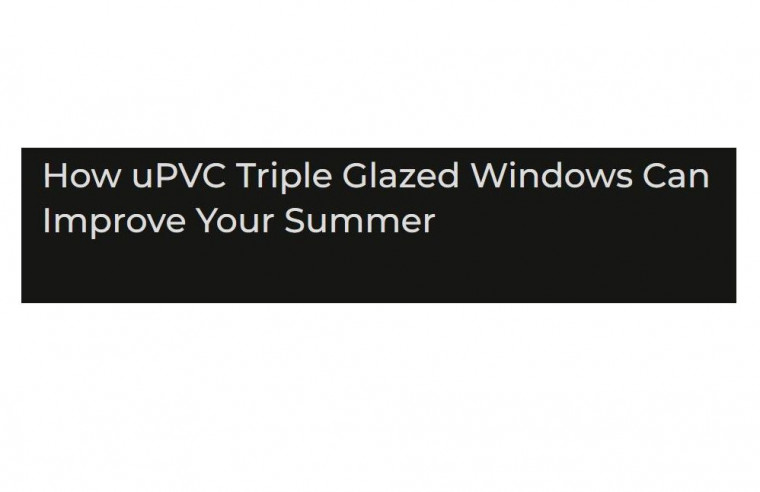-
Australia
Copyright © 2025 Powered by BCI Media Group Pty Ltd
Confirm Submission
Are you sure want to adding all Products to your Library?
Contact Detail

Designing a house to be comfortable in the heat of summer has always been a priority for the Australian architectural and building industry. Given that temperatures around the world seem to be ratcheting upwards, it's becoming even more of a consideration.
There's a growing interest in the combined benefits of uPVC and triple glazing in windows and sliding doors. These materials can work together in regulating heat and comfort, beyond that offered by conventional double glazing.
Thermotek specialises in advanced uPVC window and door systems, offering both triple-glazing and double-glazing solutions. Our products combine German engineering excellence with sustainable local manufacturing, tailored to complement the Australian climate.
In this article, we will explore how our uPVC triple-glazed window and door systems can future-proof a building project for the Australian summer.
Triple glazing is a window consisting of three glass panes. These panes are separated by spacers, creating two insulating air gaps that significantly reduce heat loss and bolster a building's energy efficiency. These gaps are often filled with gas to further enhance insulation properties.
Traditionally, triple glazing finds its place in regions with harsh winter conditions, such as Scandinavia and Northern Europe. It outperforms double glazing by adding an extra glass layer and an additional insulating air gap, effectively preventing heat from escaping and ensuring a comfortable indoor environment during chilly seasons.
However, triple-glazing's benefits for warm climates are now being recognised, as it also keeps heat from entering a house, allowing cooling systems to do their work with less energy expenditure. When triple glazing is paired with uPVC frames, it can completely negate the need for air conditioning!
uPVC is 'unplasticised' PVC. Traditional PVC - Polyvinyl chloride - is a highly flexible and insulating material used across industries. However, it is also made from 43% ethylene, a by-product of oil. Oil is a fossil fuel comprised mainly of hydrocarbons, which are a major factor in greenhouse gas emissions.
uPVC is much more sustainable, as no chemical plasticisers are necessary to make it. It consists of strong impact modifiers and fillers that make it hard and durable. It's an ideal material for the construction of window and door systems, proving resistant to knocks and requiring little maintenance.
'Unplasticised' means exactly that - no chemical plasticisers are necessary to make it. uPVC consists of long spaghetti-like strands called polymers, plus strong impact modifiers and fillers that make it a tough material often used for pipes and gutters.
It also gains strength when it is recycled - by up to 6% the first time. It gets stronger by an exponentially smaller amount each time it is recycled. Windows and doors can last up to 35 years before they're replaced. So, if the material is recycled, it could be getting stronger and stronger for over 300 years.
uPVC is also non-conductive and has excellent insulation properties, meaning that it is a great conduit to energy-efficient homes.
With fusion-welded uPVC frames featuring dual-sealed air chambers, Thermotek systems deliver exceptionally comfortable and energy-efficient homes in summer, particularly when combined with triple glazed frames. Here's how it works.
The extra layers of triple-glazed windows - and the two insulating air gaps - act as barriers to heat transfer from the outside to the inside of a home.
During the hot Australian summer months, this helps keep an indoor space cooler by preventing the penetration of external heat.
In addition, Thermotek uses Low-emissivity (Low-E) coatings on window glass, which block a portion of the sun's heat while still allowing natural light to enter. This can help regulate indoor temperatures and reduce the need for air conditioning, improving summer comfort and energy efficiency.
Thanks to its exceptional insulation properties, uPVC window and door frames also have an impressive ability to significantly improve both energy efficiency and thermal comfort within your home. They ensure a pleasant coolness during the scorching summer months and cosy warmth when winter sets in.
In contrast to aluminium frames, which require thermal breaks to be environmentally friendly, uPVC frames are non-conductive of heat. This means they effectively block the intrusion of high temperatures into your living space during the summer, reducing the need for air conditioning. Remarkably, when paired with double or triple glazing, uPVC frames can potentially eliminate the need for air conditioning.
Triple-glazed windows excel in insulation, not only against cold but also against heat. The additional layers and insulating air gaps reduce the transfer of outdoor heat, helping to maintain a more consistent and comfortable indoor temperature during the hot season.
Thus, while primarily associated with keeping cold air out in winter, triple-glazed windows also help keep conditioned air in during the summer: This results in lower energy bills as your air conditioning system doesn't need to work as hard to maintain a comfortable indoor temperature.
The uPVC used in products Thermotek's Smart Slide systems also offers outstanding thermal insulation properties. Additionally, the insulated glass units (IGUs) feature standard Low-E glazing with argon gas, further enhancing energy efficiency.
The Smart Slide systems are also beautifully designed for an indoor-outdoor flow - so when the day cools down, you can open up the house and enjoy the evening air. Other design elements help Thermotek windows and doors establish an impeccable seal against air, wind, and rain. Their innovative locking mechanism and high-quality sealing, free of brushes, contribute to the overall airtightness of the window-door systems. Moreover, the stable concealed hardware of Thermotek products needs minimal maintenance, providing added convenience and durability.
Parts of Australia are susceptible to high humidity in summer. Triple-glazed windows are effective at preventing condensation on the glass surface, which can be a common issue during humid summer days.
This reduction in moisture helps maintain indoor air quality by minimising the potential for mould growth and associated health concerns.
For homes located in bustling beach areas or near noisy thoroughfares in the summer, triple glazing offers a valuable advantage by significantly reducing noise. The extra glass layer and additional insulating air gap create an additional sound barrier, effectively blocking sound waves and vibrations. Compared to double glazing, the larger air gap between panes in triple glazing further dampens sound transmission.
Triple glazing also adds an extra layer of security, making it more challenging for potential intruders to breach. Thermotek systems all include multi-point locking for top-notch security.
In summer, bushfire awareness is crucial in Australia. Bushfire Attack Level (BAL) ratings gauge a building's potential vulnerability to bushfires by assessing its susceptibility to ember attack, radiant heat, and direct flame contact.
This rating system encompasses six levels, spanning from minimal to extreme risk. Each level prescribes specific criteria for construction materials, building methods, and features, including windows.
Thermotek systems are engineered to meet BAL 40 standards, capable of enduring significant radiant heat exposure and flame contact. Our high-performance windows incorporate fire-resistant materials like uPVC and bushfire-rated triple-glazed glass, designed to cater to the safety and comfort requirements of residents in bushfire-prone regions.
Thermotek has earned a reputation as a high-quality provider of uPVC triple-glazed windows in Australia, although we also offer double-glazing. We pride ourselves on our bespoke approach to each project and will work with you to get the right solution. Our products combine the precision of German engineering with local Melbourne-based manufacturing.
We'll also help you deliver a project within budget. While it's true that triple glazing may require a greater initial investment than single or double glazing, this is offset by the affordability of uPVC when compared to thermally broken aluminium. It is significantly more budget-friendly while achieving outstanding insulation with lower U-values.
Generally, triple-glazed windows also enhance a home's future value. Their superior energy efficiency and noise reduction qualities are very attractive to prospective buyers seeking eco-friendly properties or those located in noisy environments.
Elevate summer comfort with Thermotek's superior solutions. If you're in search of high-quality, energy-efficient window and door systems, whether that's double or triple glazing, please contact us today for expert advice.





Save Company
Add All Products to My Library
Send Meeting Request to this Supplier